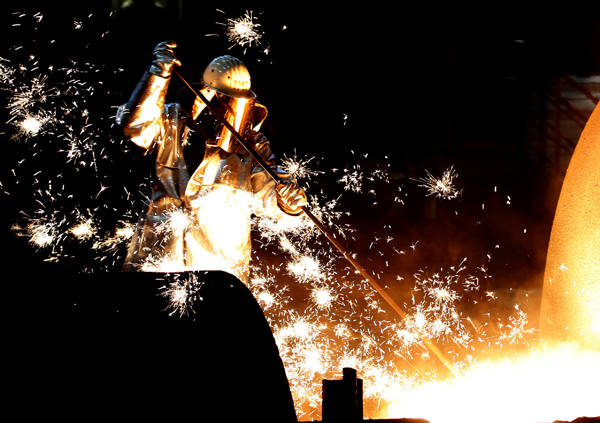As EU joins trade fight, China urges US to reconsider


China has urged the United States to abandon trade unilateralism and seek consultative solutions through dialogue, the Ministry of Commerce said on Thursday after the European Union sought to join a dispute brought by China to the World Trade Organization over US tariffs on steel and aluminum.
The EU intended to join the consultations at the WTO requested by China with the US regarding the recent US steel and aluminum tariffs, according to WTO documents filed on Monday.
"The US is abusing the term 'national security' and has severely violated WTO rules and damaged the multilateral trade system," said Gao Feng, spokesman for the Ministry of Commerce. "China will stand together with other WTO members to protect the right course and its interests."
"Hong Kong, India, Russia and Thailand have all applied to join the consultation to ensure their rights," Gao said at a news conference in Beijing.
The EU notified China, the US and the WTO's Dispute Settlement Body that it wishes to join the consultations since it has substantial trade interests in the matter.
Despite opposition from business groups and trading partners around the world, the Trump administration signed proclamations on March 8 imposing a 25 percent tariff on imported steel and a 10 percent tariff on aluminum.
"Even though the EU is exempt from the tariffs until May 1, its exports would be impaired significantly by the US measures," said Zhao Zhongxiu, a trade professor at the University of International Business and Economics in Beijing.
EU members exported nearly $6 billion worth of steel products and $1.25 billion in aluminum to the US in 2017, making it the top exporter of steel to the US and fifth-highest exporter of aluminum to the country, data from the European Commission show.
When asked about China's response to the possibility of further restrictions on investment from China in the US, Gao said China is prepared for any US limits on Chinese investment in science and technology.
"Some businesses have slowed their pace or even canceled their plans to invest in the US" because of uncertainty, Gao said.
"Chinese investment has created many jobs in the US and contributed significantly to the local economy," Gao said. "We hope the US can engage in more measures that are in line with the law of economic development and conform to the tide of the global economy."
Thilo Hanemann, director of New York-based Rhodium Group, said political influence, rather than commercial forces, already had affected two-way investment between China and the US since 2017.
"There are two factors behind such a drop, the crackdown on the irrational outbound direct investment China launched and the regulatory restrictions the US issued, which led to various consequences such as a much slower and more complicated transactions," Hanemann said.





































